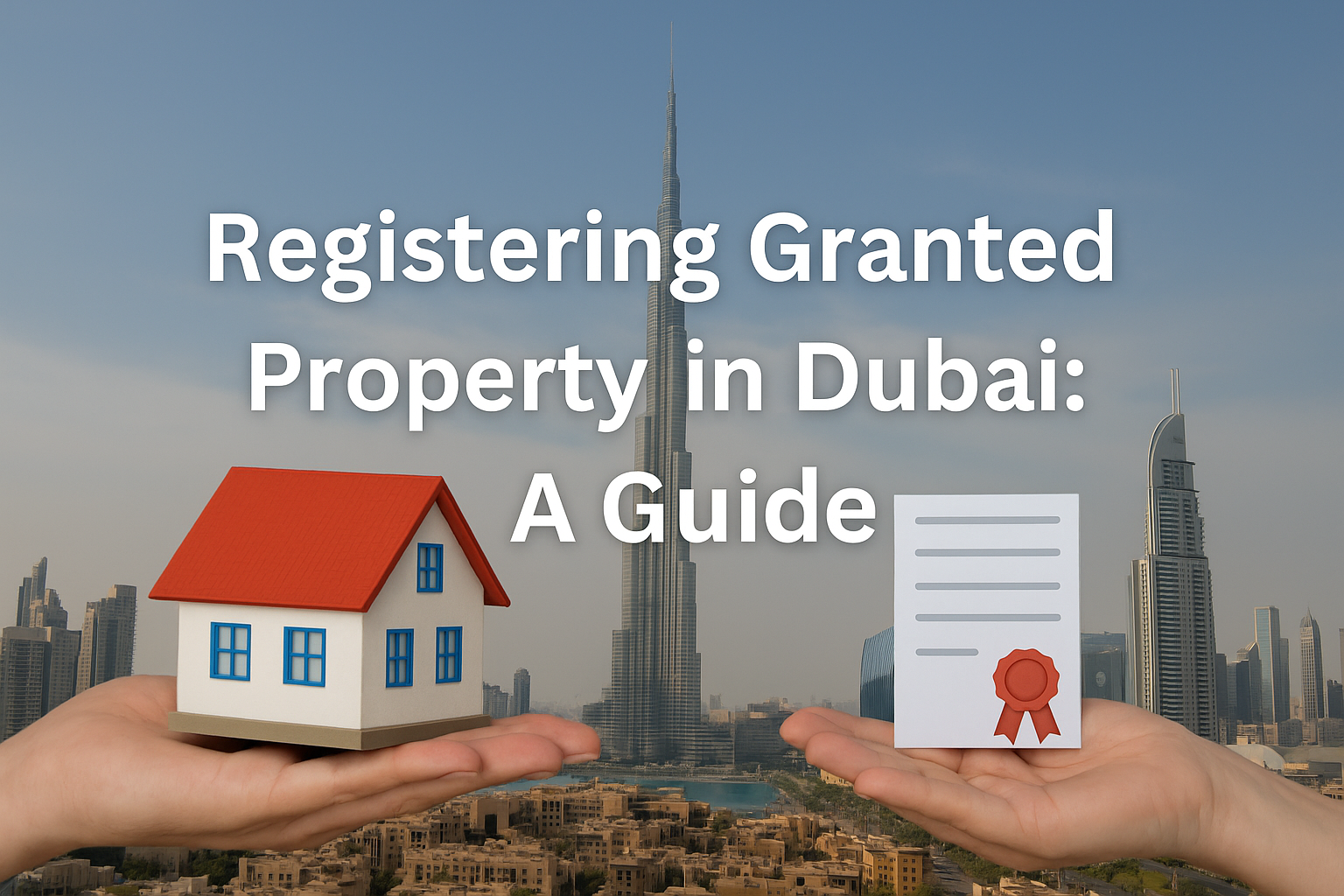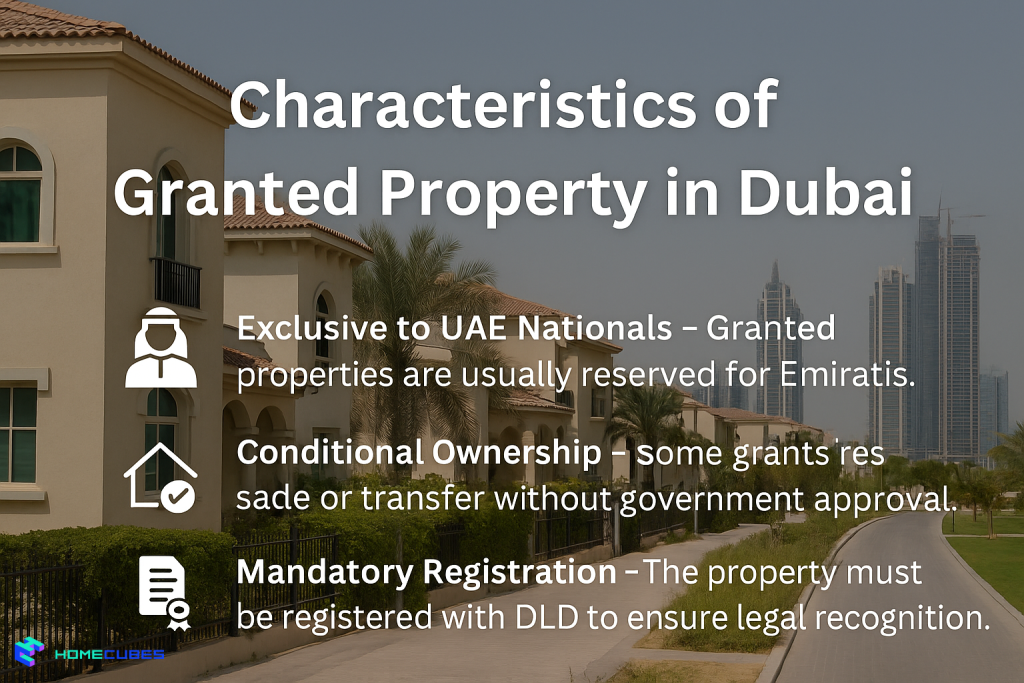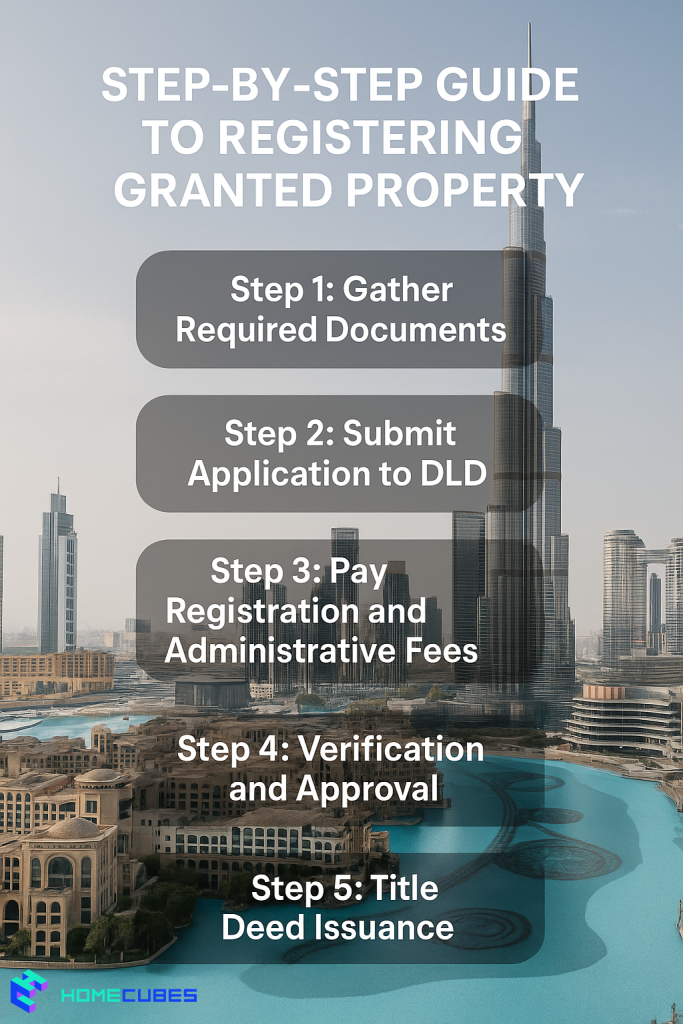

Table of Contents
- Introduction
- What Is a Granted Property in Dubai?
- Why Property Registration Is Essential
- Legal Framework Governing Property Registration
- Step-by-Step Guide to Registering Granted Property
- Step 1: Gather Required Documents
- Step 2: Submit Application to DLD
- Step 3: Pay Registration and Administrative Fees
- Step 4: Verification and Approval
- Step 5: Title Deed Issuance
- Fees and Charges Explained
- Case Study: Registering a Granted Villa Plot in Dubai
- Mistakes to Avoid During Property Registration
- Benefits of Timely Property Registration
- Common Challenges and How to Overcome Them
- Digital Solutions: DLD REST App and Online Property Registration
- Future of Property Registration in Dubai: Blockchain and Tokenization
- Frequently Asked Questions (FAQs)
- Conclusion
- Connect with Homecubes
Introduction
Dubai’s property market is one of the most advanced and investor-friendly in the world, attracting both local and international attention. While the Dubai real estate market outlook in 2025 seems growing, at the heart of this market is the Dubai Land Department (DLD), the regulatory authority responsible for ensuring that every property transaction is properly recorded and legally binding.
For UAE nationals, one unique form of ownership is the granted property—land or real estate allocated through a royal decree or government directive. Unlike purchased properties, granted properties come with their own set of requirements, the most important being official registration with DLD.
. @HamdanMohammed: Today, I oversaw the progress of citizen housing programmes in the emirate and the achievements of the Higher Committee for Development and Citizens Affairs in Dubai since its inception.
– Recently, 3,300 residential land plots were distributed in Al Yalayis… pic.twitter.com/H416ocBQw5— Dubai Media Office (@DXBMediaOffice) June 2, 2024
This guide explores the property registration process for granted properties in Dubai, explaining why it matters, the step-by-step procedure, the costs involved, and the future of digital ownership. By the end, you’ll have a clear roadmap to ensure compliance, secure your legal rights, and prepare for Dubai’s next phase of property innovation.
What Is a Granted Property in Dubai?
A granted property is real estate allocated by decree, typically from the Ruler of Dubai or relevant authorities, to UAE citizens or local institutions. This allocation is often intended to support housing, community development, or strategic investment.

Characteristics of granted property:
- Exclusive to UAE Nationals – Granted properties are usually reserved for Emiratis.
- Conditional Ownership – Some grants restrict sale or transfer without government approval.
- Mandatory Registration – The property must be registered with DLD to ensure legal recognition.
For example, a UAE citizen may be granted a residential plot to build a family home. Without registration, however, the beneficiary would face limitations in leasing, selling, or passing it on to heirs.
Why Property Registration Is Essential
Property registration is a cornerstone of Dubai’s legal real estate framework. For granted properties, it ensures:
- Proof of Legal Ownership – Registration formalizes the beneficiary’s rights under DLD records.
- Market Transparency – Creates a clear, enforceable record in Dubai’s property registry.
- Protection Against Disputes – Prevents third-party claims or overlapping ownership issues.
- Access to Property Transactions – Allows the owner to lease, mortgage, or sell (if permitted).
- Inheritance Clarity – Ensures the property can be transferred seamlessly to heirs.
Without proper registration, granted properties remain vulnerable to legal disputes, restrictions, or even forfeiture in the event of non-compliance.
Legal Framework Governing Property Registration
Dubai’s property sector operates under a robust legal framework. Key regulations include:
- Law No. 7 of 2006: Governs property registration in Dubai.
- Law No. 13 of 2008: Regulates interim property registration.
- DLD Circulars: Regular updates on procedures for granted property owners.
The Dubai Land Department remains the central authority for property ownership, while the Real Estate Regulatory Agency (RERA) oversees compliance and transparency.
For government grants, property registration is not optional—it is a legal obligation.
Step-by-Step Guide to Registering Granted Property

Step 1: Gather Required Documents
You will need:
- Original grant decree or allocation letter from the Ruler’s Court or concerned authority.
- Valid Emirates ID and passport copy.
- Completed title deed application form (from DLD).
- NOC (No Objection Certificate) if required by the granting authority.
- Power of attorney (if someone else is handling the registration).
Step 2: Submit Application to DLD
Applications can be submitted:
- In person at DLD Customer Happiness Centers.
- Online via the DLD REST App.
Step 3: Pay Registration and Administrative Fees
While the property itself is granted free of charge, fees still apply, including title deed issuance and service charges.
Step 4: Verification and Approval
The DLD verifies the decree, applicant identity, and compliance with grant conditions.
Step 5: Title Deed Issuance
Once approved, the title deed is issued in the beneficiary’s name, serving as the ultimate legal proof of ownership.
Fees and Charges Explained
Even granted properties require payment of certain fees:
- AED 250 – Title deed issuance fee.
- AED 10 – Knowledge fee.
- AED 10 – Innovation fee.
- Service fees depending on transaction type.
(Always check the official DLD fees schedule for updates.)
Case Study: Registering a Granted Villa Plot in Dubai
A UAE national was granted a villa plot in Nad Al Sheba. Instead of delaying, he registered it within one month through the DLD REST App. The process took less than two weeks, and he received the title deed digitally.
This allowed him to:
- Lease the villa legally.
- Access financing options by mortgaging the property.
- Secure inheritance rights for his children.
This case shows the importance of acting early and using digital platforms for efficiency.
Mistakes to Avoid During Property Registration
- Delaying Registration – Unregistered properties risk disputes.
- Submitting Incomplete Documents – Missing paperwork can cause rejection.
- Ignoring Grant Restrictions – Some grants forbid selling without approval.
- Using Unverified Agents – Always deal directly with DLD or licensed service providers.
Benefits of Timely Property Registration
- Legal certainty and protection.
- Ability to lease, mortgage, or invest.
- Alignment with Dubai’s smart city initiatives.
- Increased property value due to verified legal status.
Common Challenges and How to Overcome Them
- Complex paperwork → Work with DLD-approved typing centers.
- Approval delays → Submit applications online for faster processing.
- Grant restrictions → Consult with DLD before planning transactions.
Digital Solutions: DLD REST App and Online Property Registration
Dubai has digitized much of the registration process through:
- DLD REST App: Title deed issuance, fee payment, and ownership verification.
- Blockchain initiatives: In 2019, DLD introduced blockchain-based title verification, reducing fraud risk.
This shift aligns with Dubai’s Smart Government Strategy and future readiness.
Future of Property Registration in Dubai: Blockchain and Tokenization
Dubai is moving toward blockchain-powered property ownership. In the future, title deeds verification in Dubai as well as issuance may be tokenized, allowing for fractional ownership, digital transfers, and transparent compliance.
Platforms like Homecubes aim to align with this vision by preparing tokenized solutions that integrate seamlessly with DLD’s regulatory ecosystem.
Frequently Asked Questions (FAQs)
- Who can own granted property in Dubai?
Granted properties are typically reserved for UAE nationals. - Can expatriates register granted property?
No, unless specified in the decree. - How long does property registration take?
On average, 1–2 weeks if documents are complete. - Can a granted property be sold?
Only with special approval, depending on the decree. - Is online registration available?
Yes, via the DLD REST App. - What happens if I don’t register my granted property?
Failure to register can block leasing, mortgaging, or inheritance. - Are registration fees the same for all granted properties?
No, fees may vary by property type and location.
Bottomline
Registering a granted property in Dubai is not merely administrative—it secures your legal rights, safeguards against disputes, and unlocks the property’s potential for leasing, mortgaging, or passing it on to future generations. By aligning with Dubai’s advanced property registration framework, you ensure compliance and benefit from the emirate’s push toward digitization and transparency.
Timely registration avoids complications, ensures inheritance clarity, and positions owners for future opportunities, including digital ownership and tokenized property models.
Connect with Homecubes
At Homecubes, we recognize the importance of secure ownership and compliance in Dubai’s dynamic real estate market. While our real estate tokenization platform is currently awaiting licensing approval from VARA, we are committed to preparing property owners for the next wave of innovation.
We believe the future of real estate lies in digital ownership, blockchain integration, and tokenized property management. By staying informed and taking steps like registering granted properties today, you lay the groundwork for leveraging these opportunities tomorrow.
Whether you’re an individual beneficiary of a granted property or an investor preparing for Dubai’s evolving market, Homecubes offers insights and forward-thinking solutions to guide your journey.
👉 Explore how you can secure your property rights today while preparing for the digital ownership models of tomorrow. Connect with us through our Contact Page and be part of Dubai’s real estate transformation.










